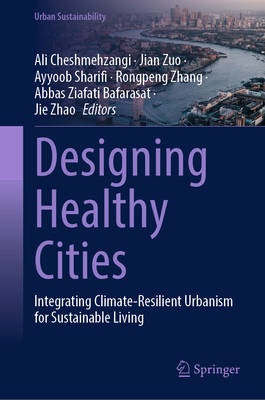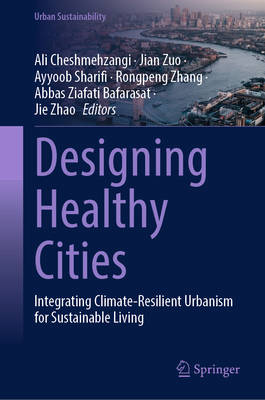
- Afhalen na 1 uur in een winkel met voorraad
- Gratis thuislevering in België vanaf € 30
- Ruim aanbod met 7 miljoen producten
- Afhalen na 1 uur in een winkel met voorraad
- Gratis thuislevering in België vanaf € 30
- Ruim aanbod met 7 miljoen producten
Zoeken
Designing Healthy Cities
Integrating Climate-Resilient Urbanism for Sustainable Living
€ 244,45
+ 488 punten
Omschrijving
This book investigates how urban planning can promote inclusive, climate-resilient, and healthy communities. With cities worldwide battling the twin problems of increasing urbanization and the intensifying effects of climate change, this book offers a relevant, multidisciplinary framework for rethinking urban areas to support equity, well-being, and environmental sustainability. The book explores the connections between environmental resilience, urban planning, and public health, grounded in state-of-the-art research and enhanced by real-world case studies. It emphasizes how urgent it is for cities to adopt proactive, forward-thinking design strategies in order to both adapt to and lessen the effects of climate change. The book offers practical advice for designing areas that are useful and improve city dwellers' physical and emotional health by fusing sustainable urbanism with human-centered methodologies. The book emphasizes the necessity of adopting comprehensive, integrated approaches to urban development from a forward-looking standpoint. It urges people to change their perspective from seeing cities only as centers of economic activity to seeing them as living ecosystems that support and care for their residents. By doing this, the book hopes to motivate a new generation of urban leaders and thinkers who are committed to creating cities that coexist peacefully with the environment. It also gives the readers the essential knowledge and resources to help create a sustainable and resilient urban future, whether they are practitioners influencing urban policy or citizens who are enthusiastic about fostering healthier living conditions.
Specificaties
Betrokkenen
- Uitgeverij:
Inhoud
- Aantal bladzijden:
- 184
- Taal:
- Engels
- Reeks:
Eigenschappen
- Productcode (EAN):
- 9789819655373
- Verschijningsdatum:
- 3/07/2025
- Uitvoering:
- Hardcover
- Formaat:
- Genaaid
- Afmetingen:
- 155 mm x 224 mm
- Gewicht:
- 453 g

Alleen bij Standaard Boekhandel
+ 488 punten op je klantenkaart van Standaard Boekhandel
Beoordelingen
We publiceren alleen reviews die voldoen aan de voorwaarden voor reviews. Bekijk onze voorwaarden voor reviews.







